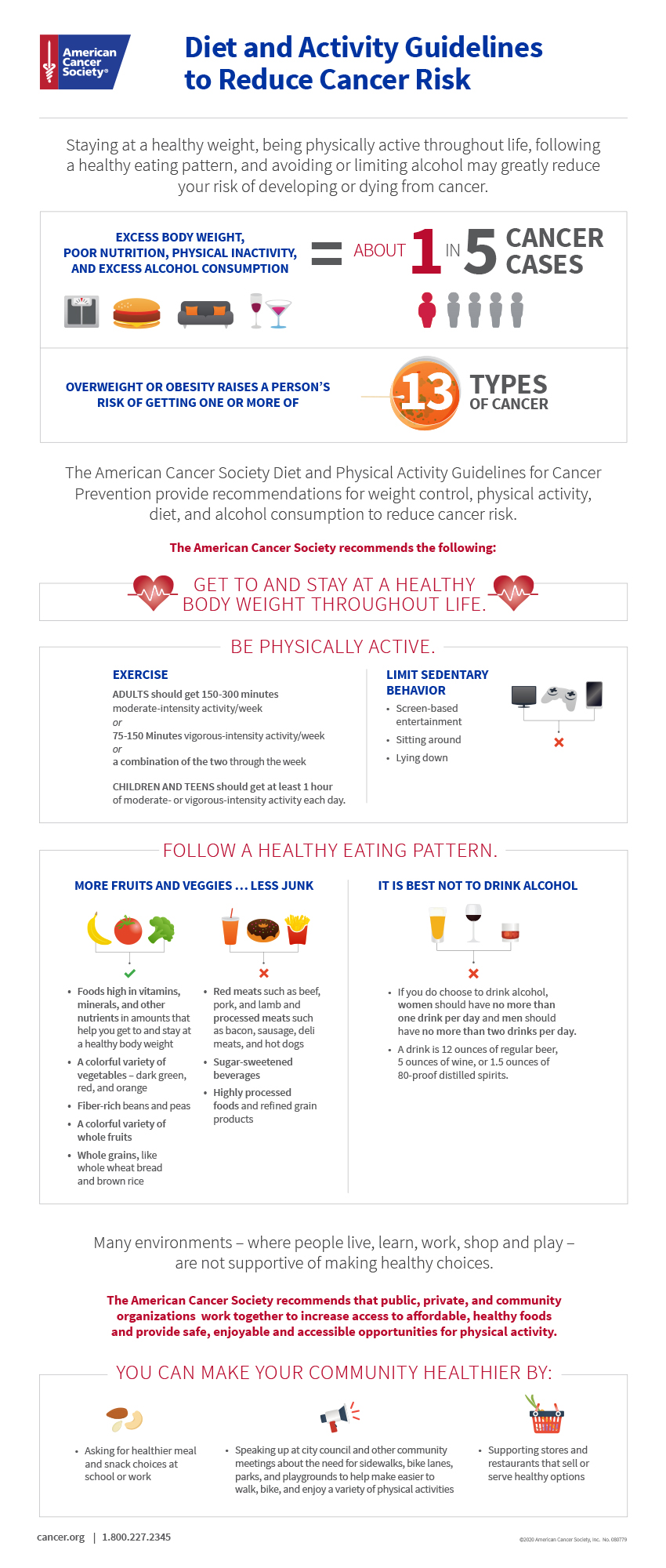Infographic: Diet and Activity Guidelines to Reduce Cancer Risk
Staying at a healthy weight, being physically active throughout life, following a healthy eating pattern, and avoiding or limiting alcohol may greatly reduce your risk of developing or dying from cancer.
This infographic highlights the American Cancer Society diet and physical activity guidelines for cancer prevention, including recommendations for weight control, physical activity, diet, and alcohol consumption to reduce cancer risk.
- Infographic
- Text Alternative

Staying at a healthy weight, being physically active throughout life, following a healthy eating pattern, and avoiding or limiting alcohol may greatly reduce your risk of developing or dying from cancer.
Excess body weight, poor nutrition, physical inactivity, and excess alcohol consumption = about 1 in 5 cancer cases.
Overweight or obesity raises a person’s risk of getting one or more of 13 types of cancer.
The American Cancer Society Diet and Physical Activity Guidelines for Cancer Prevention provide recommendations for weight control, physical activity, diet, and alcohol consumption to reduce cancer risk.
The American Cancer Society recommends...
Get to and stay at a healthy body weight throughout life
Be physically active
Exercise
- ADULTS should get 150-300 minutes moderate-intensity activity/week
Or - 75-150 Minutes vigorous-intensity activity/week
Or - A combination of the two through the week
- Children and teens should get at least 1 hour of moderate- or vigorous-intensity activity each day.
Limit sedentary behavior
- Screen-based entertainment
- Sitting around
- Lying down
Follow a healthy eating pattern
More fruits and veggies
- Foods high in vitamins, minerals, and other nutrients in amounts that help you get to and stay at a healthy body weight
- A colorful variety of vegetables – dark green, red, and orange
- Fiber-rich beans and peas
- A colorful variety of whole fruits
- Whole grains, like whole wheat bread and brown rice
Less junk
- Red meats such as beef, pork, and lamb and processed meats such as bacon, sausage, deli meats, and hot dogs
- Sugar-sweetened beverages
- Highly processed foods and refined grain products
It is best not to drink alcohol
- If you do choose to drink alcohol, women should have no more than one drink per day and men should have no more than two drinks per day.
- A drink is 12 ounces of regular beer, 5 ounces of wine, or 1.5 ounces of 80-proof distilled spirits.
Many environments – where people live, learn, work, shop and play – are not supportive of making healthy choices.
The American Cancer Society recommends that public, private, and community organizations work together to increase access to affordable, healthy foods and provide safe, enjoyable and accessible opportunities for physical activity.
You can make your community healthier by:
- Asking for healthier meal and snack choices at school or work
- Speaking up at city council and other community meetings about the need for sidewalks, bike lanes, parks, and playgrounds to help make easier to walk, bike, and enjoy a variety of physical activities
- Supporting stores and restaurants that sell or serve healthy options
American Cancer Society Emails
Sign up to stay up-to-date with news, valuable information, and ways to get involved with the American Cancer Society.


